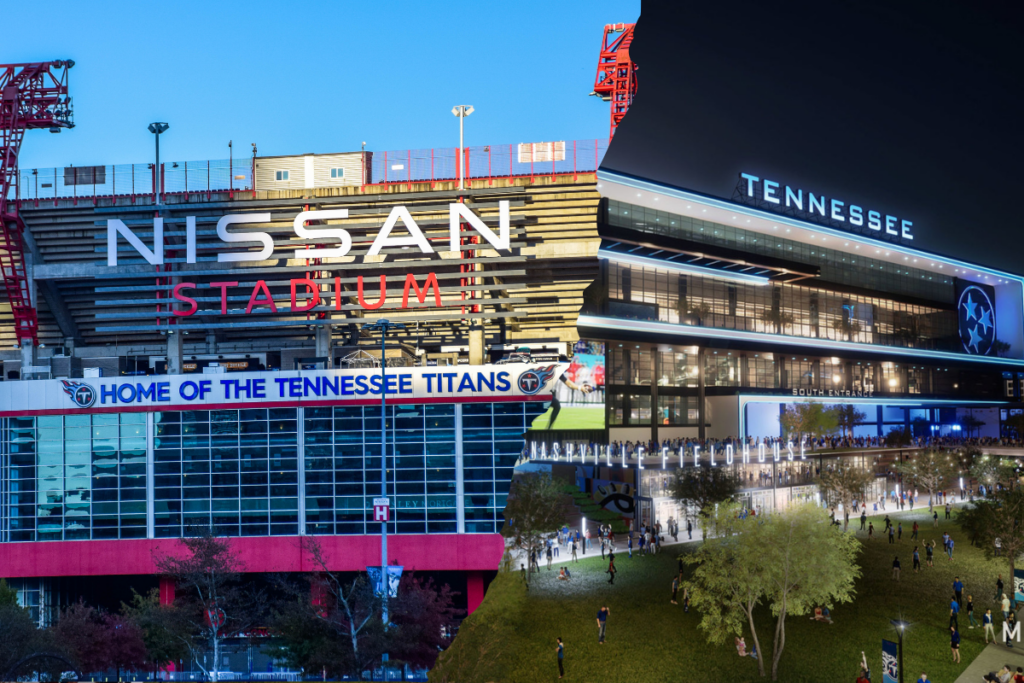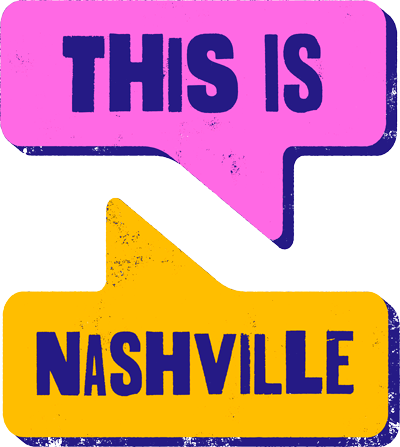
On Tuesday, the $2.1 billion plan to build a new stadium for the Tennessee Titans cleared its first procedural hurdle in the Metro Council.
On Thursday, in a follow-up to our Feb. 27 episode discussing the proposed deal, This Is Nashville spoke with a panel of community members about their concerns about the stadium. Our guests were Maryam Abolfazli, Albert Bender with the Indigenous Peoples Coalition, M. Simone Boyd and Odessa Kelly with Stand Up Nashville.
At one point in the conversation, Boyd says, “The process should be halted until we get our questions answered.” Here are some of those key questions.
Why is this deal moving so quickly?
Maryam Abolfazli: Why are we rushing? Why are we going so quickly on this one? … When you talk to the Titans and the mayor’s office, they act like they’ve been thinking about this for five years. This is a long process. Well, we haven’t been part of that process.
Odessa Kelly: Rushing deals through like this is a old classic textbook, playbook tactic that is used. Rushing is a tool of the oppressor.
What is the real cost of building a new stadium?
Maryam Abolfazli: I’m a firm believer that $2.1 billion is not the actual total of this project. I think with inflation and construction and etc., it is going to go way above that, because this is a long-term project. … My father works in construction here. His eyes were bulging out on the cost of materials month by month. … And parking … like Bob (Mendes, councilmember at-large) said on your show last week, it’s not even included in this, much less whatever else.
Listen: Community members weigh in on the future of Titans stadium
What would it actually cost to renovate the existing stadium?
Odessa Kelly: Something my grandmama told me, and my mom has told me, and my dad has told me, you know: Lies are complicated. The truth is very simple. … People purposely make things complicated to get you to disengage from the process of what is needed to get to whatever good decisions we need to make. … What you’re hearing is a number that is constructed by the Titans’ wish list to try to bring the Super Bowl here and help a bunch of rich people get even richer. … We do not know what the cost is for the minimum contractual obligation to Nashville to fulfill.
Why aren’t the Titans paying for their own new stadium?
M. Simone Boyd: Burke Nihil, the (Titans) CEO … told us early last year that the Adams family was selling all their assets. They were selling their assets so that they could help finance this deal. But we know that’s not true because last fall, majority owner Amy Adams Strunk purchased 300 acres of land in Williamson County for $14 million. She spent $14 million to purchase land. So how can we believe anything else that they’re saying is true?
What criteria are government leaders using?
Maryam Abolfazli: Tax revenue is there … to improve and develop a city, and mostly to take care of education, to take care of infrastructure, to take care of the well-being of the citizens. Now, it doesn’t matter if your tax revenue comes from hotels or from property tax. That’s why it’s there. So we’re asking, what are you all using to determine whether to spend this money to, you know, subsidize an investment like this?
Odessa Kelly: If you go back and you look at the last 10 years of the biggest developments that have happened, and where we’ve given up public dollars … really take a step back and look at it and ask, who has it helped?
Will the new hotel tax, which will partly fund the stadium’s construction, really only affect tourists?
M. Simone Boyd: That is categorically false. I don’t know the number, but we have thousands of unhoused people in this city. They live in hotels and motels. This is a countywide hotel tax. That hotel tax impacts them. … We have 1,500 Metro Schools students who live in hotels. … Unhoused people will be paying this hotel tax that they’re claiming tourists will be paying, and they will be paying into the stadium. That is unjust and it is immoral.
Why is the city acting like the Titans hold all the cards?
Maryam Abolfazli: “Negotiated” is not the word I would use to describe what has happened. What I am surprised by is, how little we hold ourselves, how small we hold ourselves as a city. We act like we are in some sort of desperate situation whereby we need to please for-profit entities that make trillions of dollars.
Why won’t the Titans hold open meetings with the community?
M. Simone Boyd: They say that they’ve had 34 meetings. They include the East Bank vision meetings in those, they include the council meeting in those. And they’ve had some handpicked meetings with community members that were soft towards them. They’ve also had some press conferences. They have never had an open meeting with community members. And I’m asking them — I asked James Weaver, the head lobbyist, for a meeting with Amy Adams Strunk, the majority owner. He turned around. He said, ‘No,’ turned around and walked away. I would like an open meeting with Amy Adams, Strunk and [East Bank Committee] Chair Mendes.
What will be the cultural and environmental impacts of building a new stadium?
Albert Bender: On the East Bank there are the ruins of a tremendously huge Native American city that existed a thousand years ago. And in fact, all of downtown Nashville sits atop this ancient, huge Native American metropolis. And without proper and appropriate archeological excavation, the erasure of this ancient Native American city — and the heritage of indigenous Tennesseans, as well as what should be brought to the attention of non-Indigenous Tennesseans — will be erased.
M. Simone Boyd: The Cumberland River is impaired. I’m concerned about clean water. Clean air. … We are in a moment where we’re facing climate change. It was 80 degrees last week. How can we learn from ancient Nashville and the people who stewarded the land so that we can think and steward the land for the seventh generation, adopt seventh-generation thinking?
Maryam Abolfazli: That is a lot of concrete. And we have some landfill issues already in this city. Where is that going?
Should a new Titans stadium be a priority for the city?
M. Simone Boyd: What we have here before us is a transfer of wealth … from us, the people, to the private interests of the Adams family. … We want education. We want infrastructure. We want we want flood mitigation in Mill Creek and southeast, and potholes filled. That’s where I think the focus should be.
Albert Bender: A new neighborhood for whom? Are we talking about houses? Are we talking about apartments? Are we talking about affordable housing? What are we talking about? Are we talking about a new neighborhood for people who have benefited from the gentrification of large areas of Nashville’s neighborhoods?
Odessa Kelly: People with vested interests take advantage of everyday working class individuals in this city. And that’s how we end up in this situation where we are now, where you have Black, brown and working class individuals who live at the fringe of Nashville. And we have made the urban core of Nashville a playground for the rich.
Maryam Abolfazli: The future Nashville is one that is not amenable for the middle class. The middle class cannot afford that Nashville That means a Nashville that does not have an income trajectory for low wage income earners, that makes them able to live a healthy and sustainable livelihood. That means that education, free education, will be the lowest quality education in the city, which is already becoming the case. That means that health care, which right now, as you all know, because we don’t do Medicaid, will be something that few and far between will have. So imagine that version of Nashville, which is already a reality.


